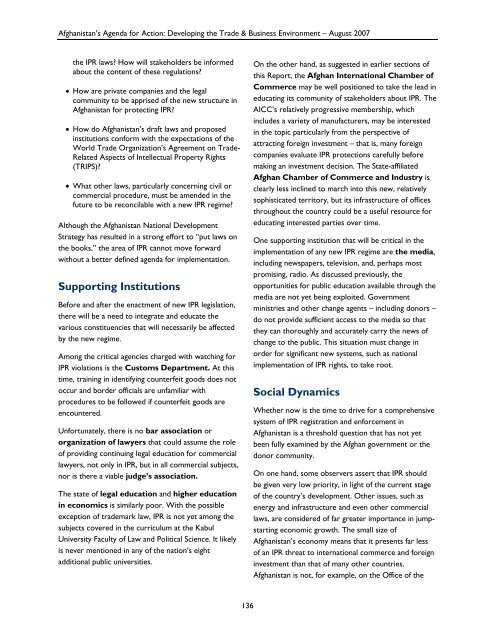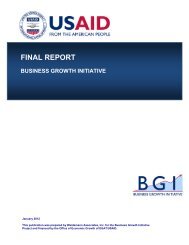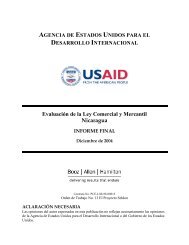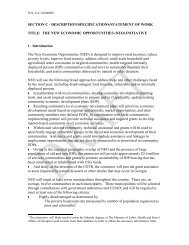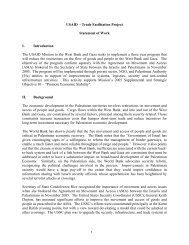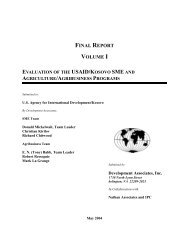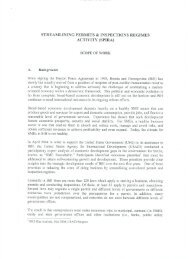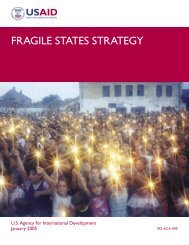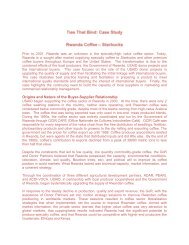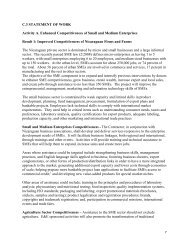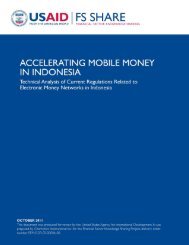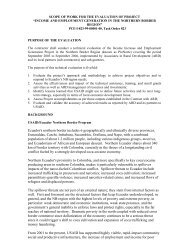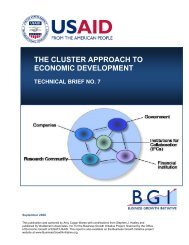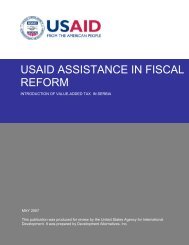Afghanistan's Agenda for Action - Economic Growth - usaid
Afghanistan's Agenda for Action - Economic Growth - usaid
Afghanistan's Agenda for Action - Economic Growth - usaid
Create successful ePaper yourself
Turn your PDF publications into a flip-book with our unique Google optimized e-Paper software.
Afghanistan’s <strong>Agenda</strong> <strong>for</strong> <strong>Action</strong>: Developing the Trade & Business Environment – August 2007the IPR laws? How will stakeholders be in<strong>for</strong>medabout the content of these regulations?• How are private companies and the legalcommunity to be apprised of the new structure inAfghanistan <strong>for</strong> protecting IPR?• How do Afghanistan’s draft laws and proposedinstitutions con<strong>for</strong>m with the expectations of theWorld Trade Organization’s Agreement on Trade-Related Aspects of Intellectual Property Rights(TRIPS)?• What other laws, particularly concerning civil orcommercial procedure, must be amended in thefuture to be reconcilable with a new IPR regime?Although the Afghanistan National DevelopmentStrategy has resulted in a strong ef<strong>for</strong>t to “put laws onthe books,” the area of IPR cannot move <strong>for</strong>wardwithout a better defined agenda <strong>for</strong> implementation.Supporting InstitutionsBe<strong>for</strong>e and after the enactment of new IPR legislation,there will be a need to integrate and educate thevarious constituencies that will necessarily be affectedby the new regime.Among the critical agencies charged with watching <strong>for</strong>IPR violations is the Customs Department. At thistime, training in identifying counterfeit goods does notoccur and border officials are unfamiliar withprocedures to be followed if counterfeit goods areencountered.Un<strong>for</strong>tunately, there is no bar association ororganization of lawyers that could assume the roleof providing continuing legal education <strong>for</strong> commerciallawyers, not only in IPR, but in all commercial subjects,nor is there a viable judge’s association.The state of legal education and higher educationin economics is similarly poor. With the possibleexception of trademark law, IPR is not yet among thesubjects covered in the curriculum at the KabulUniversity Faculty of Law and Political Science. It likelyis never mentioned in any of the nation’s eightadditional public universities.On the other hand, as suggested in earlier sections ofthis Report, the Afghan International Chamber ofCommerce may be well positioned to take the lead ineducating its community of stakeholders about IPR. TheAICC’s relatively progressive membership, whichincludes a variety of manufacturers, may be interestedin the topic particularly from the perspective ofattracting <strong>for</strong>eign investment – that is, many <strong>for</strong>eigncompanies evaluate IPR protections carefully be<strong>for</strong>emaking an investment decision. The State-affiliatedAfghan Chamber of Commerce and Industry isclearly less inclined to march into this new, relativelysophisticated territory, but its infrastructure of officesthroughout the country could be a useful resource <strong>for</strong>educating interested parties over time.One supporting institution that will be critical in theimplementation of any new IPR regime are the media,including newspapers, television, and, perhaps mostpromising, radio. As discussed previously, theopportunities <strong>for</strong> public education available through themedia are not yet being exploited. Governmentministries and other change agents – including donors –do not provide sufficient access to the media so thatthey can thoroughly and accurately carry the news ofchange to the public. This situation must change inorder <strong>for</strong> significant new systems, such as nationalimplementation of IPR rights, to take root.Social DynamicsWhether now is the time to drive <strong>for</strong> a comprehensivesystem of IPR registration and en<strong>for</strong>cement inAfghanistan is a threshold question that has not yetbeen fully examined by the Afghan government or thedonor community.On one hand, some observers assert that IPR shouldbe given very low priority, in light of the current stageof the country’s development. Other issues, such asenergy and infrastructure and even other commerciallaws, are considered of far greater importance in jumpstartingeconomic growth. The small size ofAfghanistan’s economy means that it presents far lessof an IPR threat to international commerce and <strong>for</strong>eigninvestment than that of many other countries.Afghanistan is not, <strong>for</strong> example, on the Office of the136


